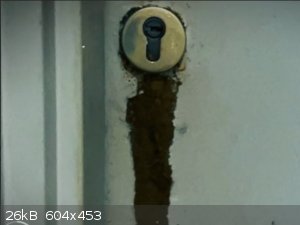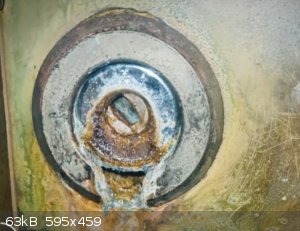Herr Haber
International Hazard
    
Posts: 1236
Registered: 29-1-2016
Member Is Offline
Mood: No Mood
|
|
Chemicals used to corrode locks & gain entry ?
A locksmith friend of mine told me there was a recent surge in break-ins using chemicals.
This has made the news but no details other than a "corrosive chemical" was published. Some journalists mentioned using liquid nitrogen. This is not
it. It is not melted either.
By the pictures it's clearly chemical: green-blue gunk on what appears brass or bronze, white / grey on what seems to be steel.
Apparently they use a squeeze bottle to push the chemical into the lock and leave it for barely a minute!
Here's the thing, the chemical doesnt magically eat away the cylinder. It just makes it easier to pick the lock.
And here is my problem: any corrosive chemical that I can think of would certainly freeze the lock in place. Not only that, but the still present
chemical would also attack lockpicking tools.
No chemical I can think of would work. I'm assuming a high level of technicity here, maybe that's the mistake.
What do you guys think ?
The spirit of adventure was upon me. Having nitric acid and copper, I had only to learn what the words 'act upon' meant. - Ira Remsen
|
|
|
paulll
Hazard to Others
  
Posts: 112
Registered: 1-5-2018
Member Is Offline
Mood: It's fine. Really.
|
|
A lubricant, surely? One that's usually grey-white but likes copper just enough to turn itself green - like something with polysulifdes in it?
|
|
|
Herr Haber
International Hazard
    
Posts: 1236
Registered: 29-1-2016
Member Is Offline
Mood: No Mood
|
|
I thought of a lubricant or something that would still "lubricate" and not lock everything in place. Just cant imagine what it could be.
I know little about lockpicking because of my friend, not enough to know if something mildly acidic could help at the task. "Rounding edges" if you
get the idea.
Maybe the corrosion / salts formed are just because of long term exposure.
I'll keep digging, I dont see a burglar team using superacids 
The spirit of adventure was upon me. Having nitric acid and copper, I had only to learn what the words 'act upon' meant. - Ira Remsen
|
|
|
XeonTheMGPony
International Hazard
    
Posts: 1640
Registered: 5-1-2016
Member Is Offline
Mood: No Mood
|
|
I knew a guy who used HCl with a dash of HNO3, it'd eat up the springs and pin in the lock making it easy to comprimise
|
|
|
Fulmen
International Hazard
    
Posts: 1726
Registered: 24-9-2005
Member Is Offline
Mood: Bored
|
|
I used to pick locks for fun, so I can kinda get it in theory. A worn or sloppy lock would be easier to pick, but in one minute? Even strong acids in
excess takes some time to do real damage, and you simply can't cram much liquid into a lock. But I can't say for sure that it won't work either, not
without some testing.
What would be the best OTC concoction? Nitric acid is getting harder to get hold of, so HCl with nitrates or peroxide perhaps?
We're not banging rocks together here. We know how to put a man back together.
|
|
|
Dr.Bob
International Hazard
    
Posts: 2759
Registered: 26-1-2011
Location: USA - NC
Member Is Offline
Mood: Mildly disgruntled scientist
|
|
A shot of graphite into a lock normally makes it easy to turn, and much easier to pick. For most locks, they can be picked by an expert in a few
seconds, so it would not help much. For complex locks, I can't imagine that acid would be any faster than a sledge hammer, saw, or grinder. I have
seen people remove very heavy padlocks in 15-30 seconds with a angle grinder and a diamond blade. I have cut off a few (legally) with a 3 foot bolt
cutter in a few seconds. Locks only keep honest people out and slow down criminals, but fortunately most of them are lazy. I had a cheap Quikset
knob type lock break once, and I just wacked it with a hammer a few times, and the hole thing broke off and I was able to open the door easily, as the
deadbolt was unlocked. Buy a few people have tried to break my deadbolts over the years and none have succeeded, thankfully.
|
|
|
Herr Haber
International Hazard
    
Posts: 1236
Registered: 29-1-2016
Member Is Offline
Mood: No Mood
|
|
Here are some pictures. I dont know if the open one was done during the act or for forensics.
Apparently in locksmith discussion groups the general consensus is that whatever he is using is just a bonus for someone who is already quite
talented.
Protection from the liquid is easy. The method is just unusual and I found it curious.
Agree with Doctor Bob. I've seen one hand sledge hammers do wonders in the hand of stuborn people 
  
The spirit of adventure was upon me. Having nitric acid and copper, I had only to learn what the words 'act upon' meant. - Ira Remsen
|
|
|
B(a)P
International Hazard
    
Posts: 1139
Registered: 29-9-2019
Member Is Offline
Mood: Festive
|
|
That is a serious amount of corrosion to occur from a small amount of acid. Looking at the last image (63kB 5955x459), it looks like a large amount of
brass has been removed from the lower half of the lock. It seems as though the stainless steel is somewhat immune, but the brass and chrome coated
steel has been heavily corroded.
|
|
|
violet sin
International Hazard
    
Posts: 1482
Registered: 2-9-2012
Location: Daydreaming of uraninite...
Member Is Offline
Mood: Good
|
|
If I had to guess from years of taking hings apart the wrong way with the wrong tools... That last image screams flathead screwdriver and/or dikes
(snipping pliers).. it looks feathered, open with rough edges and shiny there as fresh metal. Could be my imagination.
Had a friend years back loose over 2k$ out of a new F-350 because someone knew exactly where to place an icepick or similar. One very specific
location hits a tab and unlocked it. Wouldn't even need a hammer to ram it through the thin sheet metal, for a determined weirdo.. that was a very
expensive dinner out.
I don't know much about picking locks of any sort, but that person must. Wonder if a safety spring could be used to slam a wedge in the works, should
it be dissolved? Prevent the handle from turning even if the lock was picked kinda thing. Sounds like an expensive nightmare if it failed in every
day use, necessitating a visit from the locksmith or that handy sledge ha ha ha.
|
|
|
Fulmen
International Hazard
    
Posts: 1726
Registered: 24-9-2005
Member Is Offline
Mood: Bored
|
|
In the third picture it has eaten right through the the protective cover, even if it's plated pot metal it would take more than a minute. But sure,
that would do real damage to the lock. I'm not familiar with the key profile used in these locks, so it's hard to say for sure. But the last picture
does show signs of brute force.
Either way I suspect that any spring in the lock would be toast, allowing for easy "picking".
The reason for this approach is probably stealth. Bolt cutters are cumbersome and conspicuous, and only works on padlocks. Angle grinders are great
but also LOUD.
We're not banging rocks together here. We know how to put a man back together.
|
|
|
yobbo II
National Hazard
   
Posts: 766
Registered: 28-3-2016
Member Is Offline
Mood: No Mood
|
|
If one were to immerce the lock in a pickel of salty water and run electricity having the lock as the anode it would be eaten away. Would take some
time though. Plug in and come back in a few hours I suppose.
Liquid nitrogen used to be used to freeze locks and they could then be broken with a hammer as they became brittle.
Yob
|
|
|
unionised
International Hazard
    
Posts: 5128
Registered: 1-11-2003
Location: UK
Member Is Offline
Mood: No Mood
|
|
I came across this.
https://www.youtube.com/watch?v=E5yNLPW1XBU
It's interesting enough in its own way.
And it's what happens when you leave Damascus steel in acid for 2.5 years.
TLDR; there's still metal left.
(The one etched in coffee is fascinating)
I'm a bit skeptical about any acid or whatever doing much to a lock in a short enough timescale to be useful. You might just take out a spring but...
Does anyone fancy setting up a thermal lance with a chlorine cylinder?
(Don't try that at home)
|
|
|
Vomaturge
Hazard to Others
  
Posts: 286
Registered: 21-1-2018
Member Is Offline
Mood: thermodynamic
|
|
Not really relevant, but I remember the YouTuber Cody’sLab opening a padlock with a certain triol ester of a certain mineral acid…
I now have a YouTube channel. So far just electronics and basic High Voltage experimentation, but I'll hopefully have some chemistry videos soon. |
|
|
j_sum1
Administrator
       
Posts: 6337
Registered: 4-10-2014
Location: At home
Member Is Offline
Mood: Most of the ducks are in a row
|
|
Quote: Originally posted by Vomaturge  | Not really relevant, but I remember the YouTuber Cody’sLab opening a padlock with a certain triol ester of a certain mineral acid…
|
Certainly cryptic.
But, yup. That'll work.
|
|
|
Herr Haber
International Hazard
    
Posts: 1236
Registered: 29-1-2016
Member Is Offline
Mood: No Mood
|
|
Quote: Originally posted by B(a)P  | | That is a serious amount of corrosion to occur from a small amount of acid. Looking at the last image (63kB 5955x459), it looks like a large amount of
brass has been removed from the lower half of the lock. It seems as though the stainless steel is somewhat immune, but the brass and chrome coated
steel has been heavily corroded. |
Looking at that last image and the first one thing comes to my mind.
Wouldnt it be standard procedure for the locksmith intervening after the events to drill the lock ?
The first lock appears to be drilled. I wonder if some leftover acid did attack the torn metal from the drilling in the third one too.
@Violet Sin: All that me realize that there's a world with people out there
looking for 0day vulnerabilities on locks as there is for security software.
Many do it just for fun, like Mad Scientists here 
@Fulmen: Yes, apparently you are correct. I would have thought doing this would freeze the lock even more. I only picked a few training locks with my
friend and dont know much really.
@unionised: Interesting video, another good reason for me not to drink coffee ! But the etching is interesting for sure.
I'm trying to get my hands on a Zircalloy tube. I'll visit my local firestation on Saint barb with a pack of beer see if I can enlist someone for a
stupid idea 
The spirit of adventure was upon me. Having nitric acid and copper, I had only to learn what the words 'act upon' meant. - Ira Remsen
|
|
|